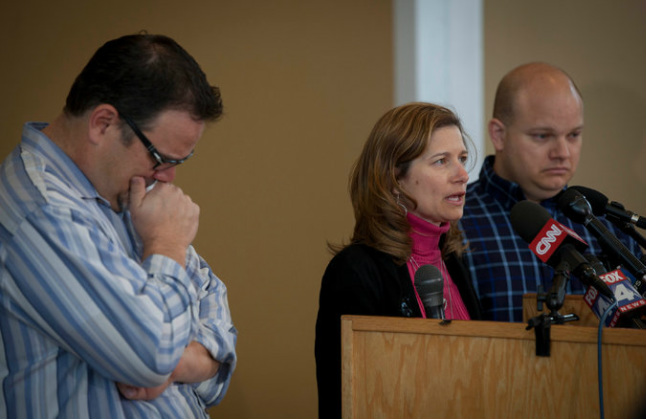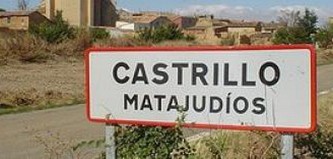 Editor's Note: Below is a very strange and disturbing article that seems to suggest that Frazier Glenn Miller shot "the wrong people" in Kansas. If these victims had been Jewish, as intended, and not Christians, by mistake, would the NYT have listed their synagogue memberships, special talents, and selfless volunteerism? Apparent Hate Crime Aimed at Jews Instead Strikes Christians Who Gave to Others, By Ian Lovett, New York Times, April 14, 2014 William L. Corporon was a longtime family doctor, but to his family, he was Popeye, a nickname bestowed by a grandson, Reat Underwood. On Sunday, it was Popeye who was drafted to take Reat to audition for KC SuperStar, a singing competition for high school students in the Kansas City area. A member of church and school choirs and an actor in summer theater productions in the park, Reat had wanted to try out for years. Now, as a 14-year-old high school freshman, he was finally old enough. Dressed in a coat and tie, he had prepared a song called “You’re Going to Miss Me When I’m Gone,” which he sang for his mother on Sunday. She kissed him goodbye. Then he jumped into his grandfather’s truck. But in early afternoon, the authorities say, Reat and his grandfather were both fatally shot in the parking lot outside the Jewish Community Center in Overland Park, Kan., where the audition was being held. Dr. Corporon, 69, was pronounced dead at the scene, Reat a short while later at a hospital. Although the shooting suspect, Frazier Glenn Miller, was a known racist and anti-Semite with ties to the Ku Klux Klan, the victims who were gunned down on Sunday were all Christians, devoted to their families, to their churches and to serving their Kansas City communities. Ms. LaManno worked as an occupational therapist for children with visual impairments. She sat with them one on one for hours — from their infancy until age 10 — teaching them fine-motor skills. And always, her co-workers said, she expressed gratitude for what she had in her life, particularly for children. She had two daughters: one grown, the other set to graduate from college this year. Her son, a sophomore at Kansas State University, also volunteered at the Children’s Center for the Visually Impaired, where Ms. LaManno worked. “She was this beautiful, caring, gracious spirit,” said Nicola Heskett, executive director of the center. “That spirit of giving back, she was instilling in her children.” Co-workers and friends described Ms. LaManno as a consummate nurturer, someone who would shuttle her father-in-law to his doctor’s appointments, and happily take on whatever was asked of her at work. “Of course she was there seeing her mom because that’s Terri,” Ms. Heskett said. “That’s what Terri did. She took care of everyone.” Dr. Corporon, too, had made a career out of helping children, often starting at their very first breath. As a family doctor for 30 years in Oklahoma, he was the first to touch scores of newborn babies, his son Will Corporon said Monday. Dr. Corporon’s own family came first, however. And in 2003, he and his wife left Oklahoma, moving north to be closer to their grandchildren in Johnson County, Kan. (though the family remained devoted fans of the Oklahoma Sooners). “They were together all the time, my father and Reat, and the other grandkids,” Will Corporon said. There were 10 grandchildren, and “my father always had one of them with him, or more,” Mr. Corporon said. “He died doing exactly what he wanted.” Reat had big plans this year. There was the long-awaited audition for KC SuperStar. But he also had theater productions, in school and out. He was working toward becoming an Eagle Scout and was looking forward to debate camp in the summer. Somehow, amid all of this, he volunteered at his Methodist church, where he would watch the young children, playing with them or reading Bible stories, while their parents were in services. “He had a really full life for a 14-year-old, and we were very blessed,” his mother, Mindy Corporon, said. “He loved his school, and he loved his friends.” She said Reat had already signed up to be an organ donor when he got his learner’s permit. “This isn’t easy,” Ms. Corporon said. But she added that she took great solace in her faith, and in the moments before he left for the audition. “I got to kiss him and tell him I loved him,” she said.  JTA, April 11, 2014 A Spanish village is considering removing the phrase "kill Jews" from its name. The village of Castrillo Matajudios near Leon in northern Spain will convene its 60 resident families at a town hall meeting next week to discuss and vote on the first formal proposal to change the village's name, the regional daily Diario de Burgos reported Friday. Mayor Lorenzo Rodriguez, who submitted the proposal, suggested changing the village's name to Castrillo Mota de Judios, which means "Castrillo Jews' Hill." He said this was the village's original name, but it was changed during the Spanish Inquisition. In parts of Spain, and especially in the north, locals use the term "killing Jews" (matar Judios) to describe the traditional drinking of lemonade spiked with alcohol at festivals held in city squares at Easter, or drinking in general. Leon will hold its "matar Judios" fiesta on Good Friday, April 18, where organizers estimate 40,000 gallons of lemonade will be sold. The name originates from medieval times, when converted Jews would sometimes be publicly executed in show trials at around Easter, Maria Royo, a spokesperson for the Federation of Jewish Communities of Spain told JTA. "Regrettably, this type of expression exists in Spain in ceremonies and parties," she said, but added that "the people saying it are mostly unaware of the history. It is a complicated issue that is ingrained in local culture." The federation is in contact on this issue with authorities, but given the popularity of the expression, "it is impossible to forbid this language" in that context, she added. Last month, Ramon Benavides, the president of a local associations of hoteliers, told the news agency EFE: "When 'killing Jews,' it's best to take it slow and keep track of how much you drink to avoid excesses and its consequences the next day." |
CISA Blog
This blog provides selective critical analysis on developments in contemporary culture related to the subjects of antisemitism, racism, the Holocaust, genocide, and human rights.
|
© 2025 Canadian Institute for the Study of Antisemitism. All Rights Reserved.
 RSS Feed
RSS Feed